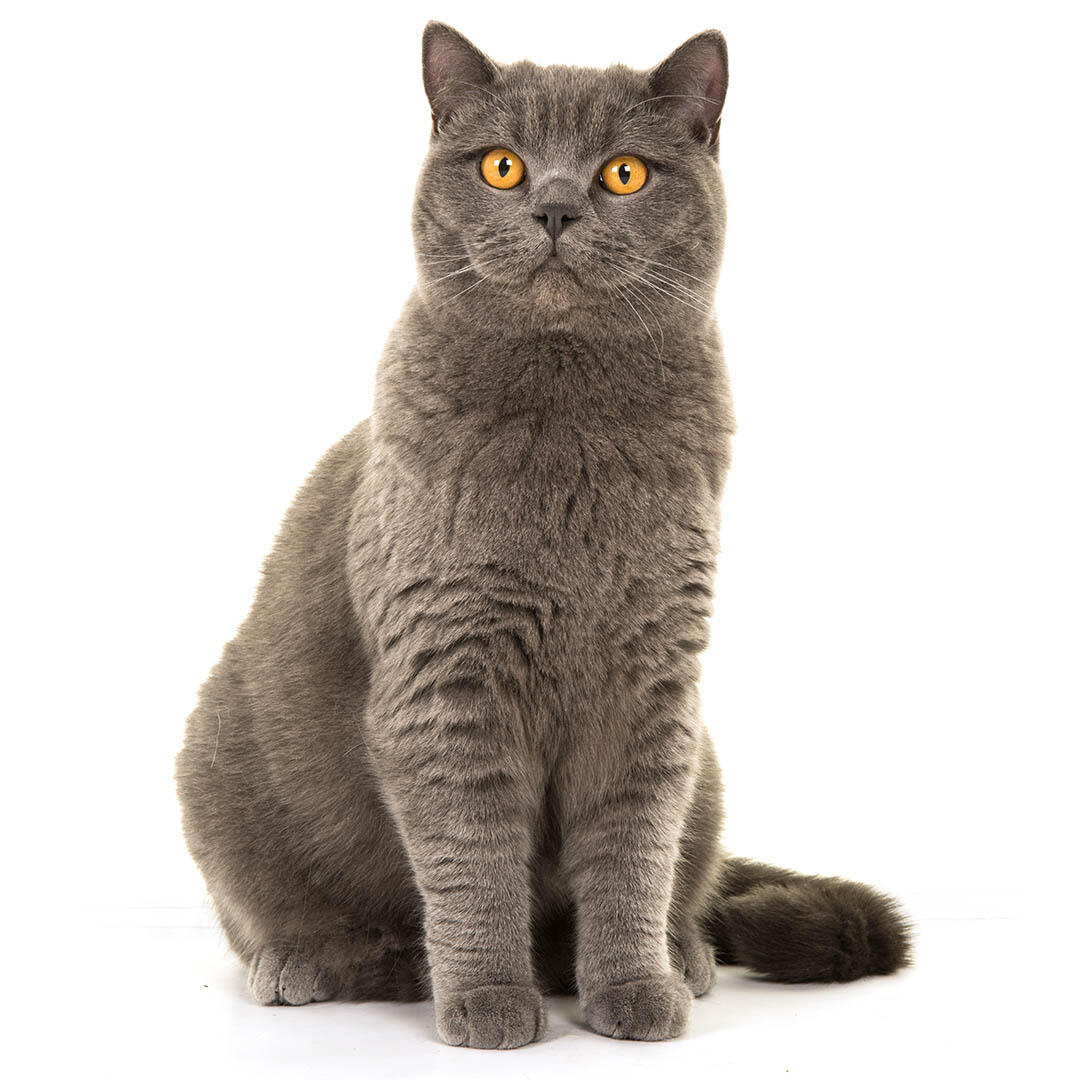
| Family-friendly: | 2/5 |
| Playfulness: | 2/5 |
| Intelligence: | 3/5 |
| Tendency to Vocalise: | 4/5 |
| Likes Other Pets: | 5/5 |
| Grooming needs: | 4/5 |
| Shedding: | 3/5 |
The British Shorthair cat breed can be prone to:
- Polycystic kidney disease which is an inherited condition where cysts form in the kidneys. This affects kidney function and can eventually lead to kidney failure.
- Hypertrophic cardiomyopathy which is a disease were the heart muscle becomes abnormally thick which means the heart cannot beat effectively.
- British Shorthair autoimmune lymphoproliferative syndrome which is a serious condition where an abnormally large amount of immune cells are produced which leads to organ enlargement, anaemia and general illness.
Testing available:
- DNA testing for British Shorthair autoimmune lymphoproliferative syndrome which tests whether or not a cat has the potential to be affected by this condition.
The British Shorthair is a medium to large sized, compact, chunky cat, known for their attractive features and thick, plush fur.
Short coupled and robust, the British Shorthair is instantly recognisable by their rounded face and large round eyes, giving this cat an adorable expression and bags of character.
Affectionate, playful, and loyal, the British Shorthair is a very companionable cat with family and close friends, although like many cats they may take a little time to warm up to strangers. A relatively quiet cat, and surprisingly gregarious, the British Shorthair gets on well in multi-cat households and will befriend other household pets too, particularly cat-friendly dogs.
| Family-friendly: | 2/5 |
| Playfulness: | 2/5 |
| Intelligence: | 3/5 |
| Tendency to Vocalise: | 4/5 |
| Likes Other Pets: | 5/5 |
| Grooming needs: | 4/5 |
| Shedding: | 3/5 |
Likely to be the first selectively bred cat breed, despite its name, the British Shorthair traces its roots back to Rome, and the cats brought here with the Romans, as mousers, ratters, and probably sneaky stowaways! Cats brought by Roman invaders would have had to be tough, clever, weather-proof, and hardy, to survive the journey and to breed with the native wildcats! Once on British soil, they made themselves at home and eventually began to be selectively bred for their rounded and appealing appearance, and affectionate nature. First recorded as the British Shorthair in 1870, the breed has been popular ever since.
Happy indoors with sufficient entertainment, or outdoors providing a safe, cat-secure garden is available, the British Shorthair is more inclined toward short bursts of activity, interspersed with long naps, than lengthy periods of exercise. To provide the best of both worlds, free access to an outdoor cat secure area or ‘catio’ will meet the British Shorthair’s needs nicely.
The British Shorthair does need company and this is a very human-oriented breed. They like their people, and they like to spend plenty of time with them.
Not quite so curious and active as some, the British Shorthair can be a bit of a couch-potato, so it is wise to encourage some exercise in the form of food dispensing toys, and chasing games. Cat trees can be used cleverly and by hiding little piles of food on each level rather than feeding from a bowl, you can encourage your British Shorthair to move around to ‘hunt’ for food — as they do have a tendency to put on weight.
Every cat is unique and each has their own particular likes, dislikes, and needs when it comes to food. However, cats are carnivores and every cat must obtain 41 different and specific nutrients from their food. The proportion of these nutrients will vary depending on age, lifestyle, and overall health, so it's not surprising that a growing, energetic British Blue kitten needs a different balance of nutrients in their diet than a less active senior cat. Other considerations to bear in mind are feeding the right quantity of food to maintain 'ideal body condition' in accordance with feeding guidelines and catering to individual preference regarding wet or dry food recipes.
Although a shorthaired cat, the British Shorthair has a very dense coat, so a comb through once a week will help get rid of dead hair, and will serve as a good check over for any parasites or injuries. By doing a quick groom regularly, you’ll be able to spot if a cat is unwell, one of the first signs is often a greasy coat where a cat is unable to reach, or not feeling well enough to make the usual effort.
As with all cats, regular vaccination and parasite control is recommended and this should be discussed with your vet, as well as an annual veterinary cat health check.
Friendly, loyal, and people loving, the British Shorthair is ideal for child-free homes and homes with older children, however they are not particularly forgiving of very small children who haven’t yet learned to respect a cat. Their wide-eyed, round-faced appearance is often mistaken by very young children as being that of a toy or doll, so caution should be exercised.
Yes, they can be very friendly with anyone, however, can sometimes be less forgiving of children, especially those who are not used to cat behaviours. So, best to introduce them slowly, and make sure children respect their space needs.
British Blue cats are known to be very placid and easy going so they prefer spending most of their time lounging around and napping, rather than being highly active.
In general, they can be slightly chatty, especially when they want something and need to get your attention.
Although they love getting attention, British Blue cats are not big fans of being picked up and mostly prefer a hands-off approach when interacting with humans. Picking them up puts them in a vulnerable and uncomfortable situation, so it’s best to keep pick-ups and hugs to a minimum.